|
Zach Ferenbaugh
|
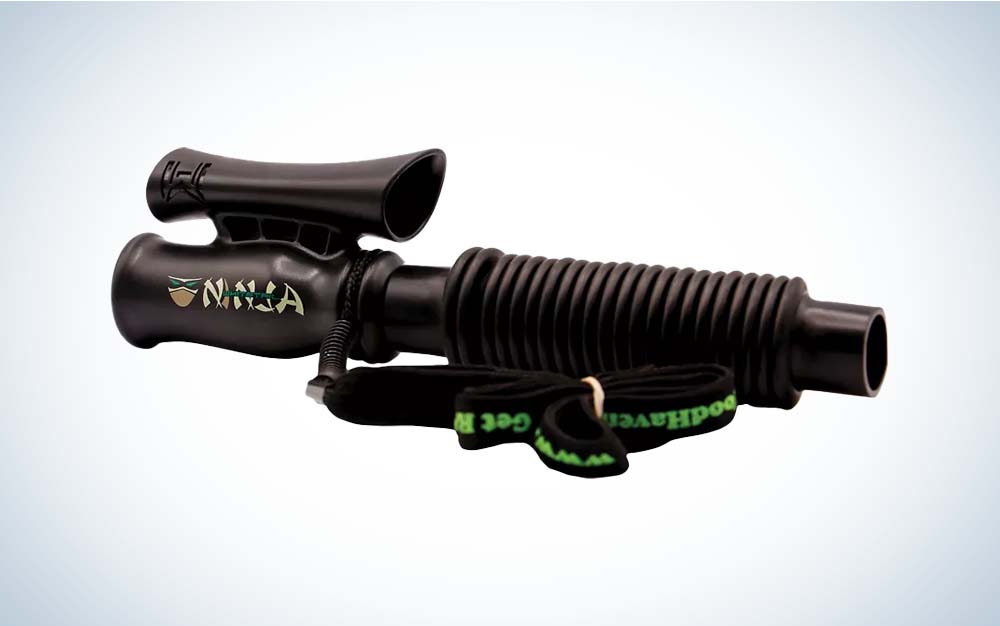
|
WoodHaven Ninja Intimidator
|
Check Price
|
LEARN MORE
|
Summary
A lot of call, for a little cash.
|
|
Best Synthetic Rattling Antlers
|

|
Hunter’s Specialties Rack Jack
|
Check Price
|
LEARN MORE
|
Summary
A packable, realistic alternative to traditional rattling antlers.
|
|
Best Doe Bleat
|
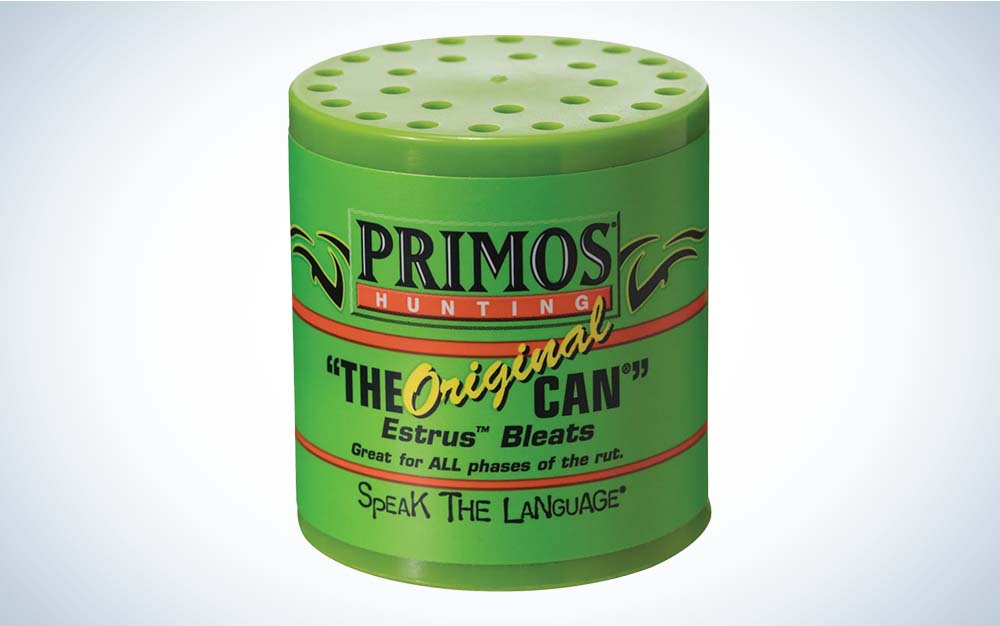
|
Primos Hunting The Original Can
|
Check Price
|
LEARN MORE
|
Summary
Classic and easy-to-use with super realistic sounds.
|
Deer calls won’t guarantee you that a Booner will run into your setup. But when used strategically, they can grab a deer’s attention. They can even bring them—ever so cautiously—into range. That’s not to say that a rut-crazed buck won’t throw all caution to the wind and come crashing under your stand, but that’s rarely the case when it comes to calling deer. And if you’re calling blind, they’ll probably give you the slip without ever letting you know it.
Still, deer calls have fooled enough big bucks to earn a spot in your pack. But don’t just take my word for it. I interviewed expert deer hunters on how they use the best deer calls and the ones they rely on each season.
- Zach Ferenbaugh: WoodHaven Ninja Intimidator
- Dan Infalt: Hunter’s Specialties True Talker
- Mark Drury: Hunter’s Specialties Buck Bark
- Best Synthetic Rattling Antlers: Hunter’s Specialties Rack Jack
- Will Primos: Primos Hunting Buck Roar 2
- Best Doe Bleat: Primos Hunting The Original Can
- Best DIY: Shed Antlers
Zach Ferenbaugh: WoodHaven Ninja Intimidator
Why It Made the Cut
Zach Ferenbaugh’s aggressive whitetail tactics call for an aggressive style of calling. And the WoodHaven Intimidator allows him to make the softest or loudest grunts whether he’s hunting on the edge of a buck bed or 100 yards away.
Key Features
- Flexible grunt tube
- Included lanyard
Pros
- Versatile
- More affordable than others
- Flexible grunt tube allows you to dial in the volume
- Doesn’t require a ton of air flow
Cons
- Some might prefer a solid grunt tube
Product Description
The Hunting Public’s Zach Ferenbaugh earns a living killing big bucks from the ground with aggressive tactics. And that same ground game gives him an edge when he’s calling deer as well. When it comes to calls, he prefers WoodHaven’s Intimidator.
“I’ve used a lot of calls over the years, but this is by far my favorite,” Ferenbaugh says. “I can be as subtle as I need, or I can crank up the volume if I need to grab a deer’s attention, even if he’s 100 yards away. If you look at our videos, this call is literally tied to my vest all season long.”
One of the biggest pitfalls with deer calling is that most of the time hunters are posted 12-20 feet in the best tree stands with minimal cover. Other than the fact that deer don’t typically hang out in trees, this setup can leave you exposed or vulnerable to a whitetail if he decides to circle downwind of you. But if you’re hunting from the ground, there’s a chance you can tuck into some cover or even anticipate a deer trying to get downwind of you, Ferenbaugh says.
While some hunters might be hesitant to blind call, Ferenbaugh relishes it, especially if he thinks he’s near a bedded buck.
“I blind call quite a bit actually,” Ferenbaugh says. “But setup is the key in these situations. A lot of times I’ll put super thick vegetation between me and where I want the deer to come. But the best scenario when you’re blind calling is to set up where you have a predominant wind and a thermal pull that create the perfect wind scenario. The predominant wind makes the buck think he has the wind in his favor, but that thermal pull, as long as you’re set up correctly, draws it away from him.”
If he feels confident in his setup, which involves tucking into some ground cover, Ferenbaugh tries to mimic a buck approaching another buck’s bedding area. The Intimidator’s sound quality works great when he’s close to a buck’s bed, because Ferenbaugh can make extremely subtle, realistic grunts without overdoing the volume. These subtle grunts are easy to make because the reeds on this call don’t require a ton of airflow to produce quality sounds. However, his first call actually has nothing to do with the Intimidator.
“While I’m setting up, I’ll mimic a buck making a scrape,” Ferenbaugh says. “So, I’ll start raking back the leaves and stomping like a buck does when he makes a scrape, and that’s my initial call. I’ll stop after that initial scrape and make sure I haven’t called anything in. If I haven’t, I’ll rake the leaves again, pair it with a few grunts, a snort wheeze. This is why I love the Intimidator, because the calls it makes are so similar to the deer sounds I actually hear in the woods. But I pretty much make a scrape every time I’m in the woods.”
His rationale behind making the scrape is that it’s a sound deer make just as much as they do other vocalizations. Because he’s hunting from the ground, he’s able to create a more realistic calling scenario than hunting from a tree allows. In the video below, Ferenbaugh demonstrates how realism makes calling more effective, when a buck charges within ten yards of his setup.
“A lot of people will tell you that deer are call-shy in certain areas, and I don’t completely disagree with that statement,” Ferenbaugh says. “But if you’re calling in an area where there’s a mature buck, he’s probably had a good dose of hunters calling to him. If you’re not adding the realism like breaking sticks or raking leaves, he’s going to be wary of that, and you’re probably less likely to call in that buck no matter what call you’re using.”
Ferenbaugh cites an instance in which he heard another hunter drive in on a four-wheeler and start rattling with a plastic pair of antlers. Even if he hadn’t heard the atv, he would have pegged the rattling as fake. Fast forward to the next day, and Ferenbaugh returned to the spot, went through his go-to calling sequence, and rattled in a buck. Realism made all the difference, he says.
I asked Ferenbaugh if there’s a particular time of year he prefers to call, but he isn’t opposed to calling any time of year.
“I don’t think it ever hurts to call based on the time of year,” he says. “I’ve watched a buck grunt and make rubs during the early part of September. Even in the late season there’s still some bucks that are fired up and looking for does, and those can be especially susceptible to calling.”
Dan Infalt: Hunter’s Specialties True Talker
Why It Made the Cut
Dan Infalt prefers to rely on his proven buck bed tactics, but when he does use a call, it’s always the Hunter’s Specialties True Talker, which strikes the perfect tone for him.
Key Features
- Five sounds in one call
- Fingertip control
- Includes Lanyard
Pros
- Realistic grunts and snort wheeze
- Compact
- Easy to manipulate sounds
Cons
- Not as loud as other calls
Product Description
If Zach Ferenbaugh falls on one end of the calling spectrum, Dan Infalt of the Hunting Beast holds down the other side. The notorious graphic t-shirt wearing, big buck-bed hunter errs on the side of caution because he’s typically in heavily hunted areas where it’s not uncommon to hear other hunters calling in the distance. But when he does call, he prefers to use the Hunter’s Specialties True Talker.
“A lot of calls don’t have the right tone, but I love this one,” Infalt says. “The snort wheeze works really well, and I’ve had a lot of success with that call. I ran into a giant mountain buck in Pennsylvania that was just out of range, and it turned him right around.”
Ask hunters how they feel about calling blind, and you’ll get a different answer every time. And it’s not something Infalt advises.
“I never call blind,” he says. “The deer I hunt are pretty educated, so I really only call to a deer that I see, and it’s often out of desperation. If I’m calling to a deer, it’s because he’s out of range, and I’m trying to get him in my lane. But even then, I’m hesitant. If a deer responds to your grunts, he’s coming in expecting a fight. That immediately puts them on edge, so they’re more likely to pinpoint you, jump the string, or circle downwind.”
If he sees a deer that’s in sight but out of range, Infalt gauges the deer’s body language to get a reading. He’s noticed that a lot of time, especially if a buck is well out of range, it can take a roaring grunt to get a deer’s attention. The True Talker might not hit the volume range of other calls on this list with the same quality, but it can still grab a deer’s attention, and for subtle grunts or sounds, it sings.
“A lot of hunters will grunt at a deer that’s out of range, and when he doesn’t respond, they assume he’s ignoring them,” Infalt says. “Most of the time, they just don’t hear you. In those instances, I’ll blow the True Talker so loud that it doesn’t even sound like a deer, and it will stop that buck in his tracks. Then, I’ll follow that up with a normal grunt and they come running.”
Infalt says the main mistakes that hunters make with calling is that they overcall or don’t think about a buck trying to get downwind of them if they call blind. And if you’re going to call blind, save it for the golden hour when deer are more likely to move or they’re already on their way. You can check out more calling tips from Infalt in this video.
Mark Drury: Hunter’s Specialties Buck Bark Deer Call
Why It Made the Cut
The Hunter’s Specialties Buck Bark Deer Call allows Drury to utilize the whitetail’s full vocabulary at subtle or roaring volumes.
Key Features
- Injection-molded rubber construction
- Snort wheeze chamber
- Adjustable o-ring on reed
Pros
- Versatile
- Wide range of volume
Cons
Product Description
Mark Drury has been killing big bucks on camera since the editing process required cutting and splicing film. And he’s still arrowing monster whitetails. It’s no secret that Drury Outdoors partners with Hunter’s Specialties to make plenty of deer calls. Out of them all, Drury prefers the Buck Bark grunt tube.
“I love the Buck Bark because it’s so versatile,” he says. “You can do everything like grunts and barks, growls, snort wheeze, even the clicking sounds that bucks sometimes make. The tone of this call is so realistic, and you can be as loud or as subtle as you want. Whether I plan to use it or not, I always carry this call on hunts.”
Drury isn’t always itching to call, though. And while he might not be waiting for the stars to align, he won’t call unless he thinks the wind conditions and terrain features can present a perfect window of opportunity.
“I’m really picky when I call to a deer,” Drury says. “If I think conditions are right, I’ll work my way up the ladder of sounds. And I rarely blind call because it’s too easy for deer to bust you when you don’t know where they’re at or where they’re coming from. That’s why I typically save most of my calling for when I can lay eyes on a deer if he’s just out of range.”
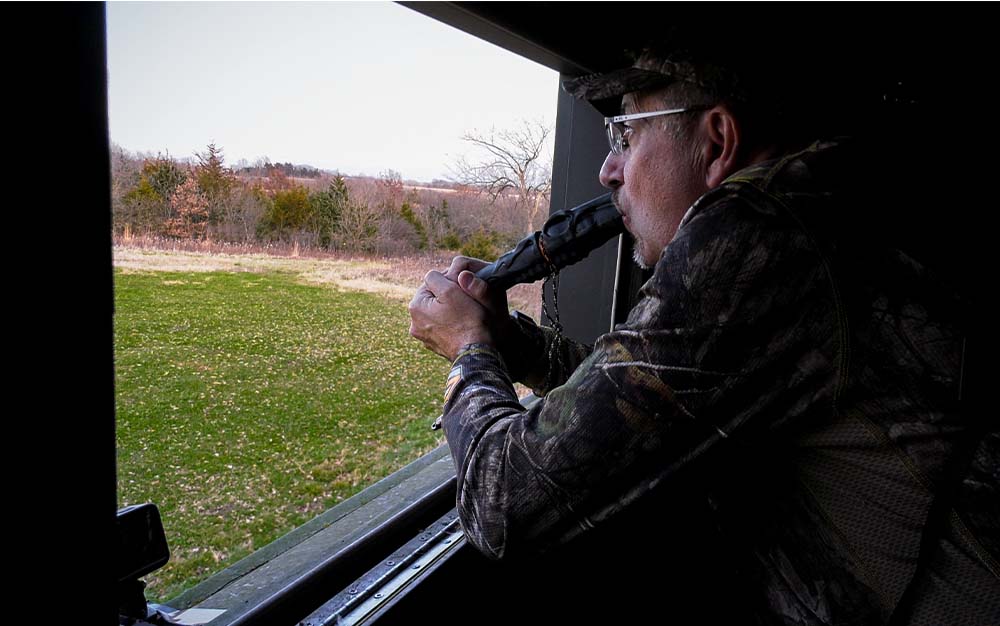
The Buck Bark is loud enough to grab a buck’s attention even if he’s at the other end of the field. Drury Outdoors
A lot of times Drury calls to deer that might be 100-125 yards away, but the Buck Bark’s volume allows him to stop deer at that range without feeling like he’s sounding the seventh trumpet. He can also draw out those long growls without sacrificing the sound quality when he needs to grab a buck’s attention on especially windy days.
Because he’s typically calling to deer he can see, Drury focuses on how deer react to each call. A buck’s initial reaction will quickly indicate if he’s interested or not, Drury says.
“I always start out at the bottom rung when it comes to volume and tactics, and I tell other hunters to do the same thing,” he says. “I’ll start with a soft attending grunt, because a lot of deer turn on that initial call. If I can tell that I’ve got his attention, I’ll grunt louder. Then I’ll get more aggressive. But if a buck doesn’t give me a positive posture, if he seems on edge, or if he seems uninterested, then I’ll just let him walk.”
Best Synthetic Rattling Antlers: Hunter’s Specialties Rack Jack
Why It Made the Cut
This compact rattling call packs easier than a pair of sheds but provides a wider range of sounds and volume than a typical rattle bag.
Key Features
- Two piece design
- Rod collapses into Cylinder
- Injection molded
Pros
- Compact
- Wide range of volume
- Locks in position for quiet transport
Cons
- Like other rattling calls, requires two-handed use
Product Description
While Mark Drury is careful to take a buck’s temperature before calling, he’ll use more aggressive tactics whenever the rut hits and create more elaborate calling sequences.
“During the rut, I like to paint a vivid picture,” Drury says. “I’ll start with a grunt, then wheeze, then grunt, then do a rattling sequence with our Rack Jack to make a buck believe that two bucks are fighting over a doe. The Rack Jack is great because you can fit it in your jacket pocket, and deer can’t tell the difference between it and a pair of rattling antlers.”
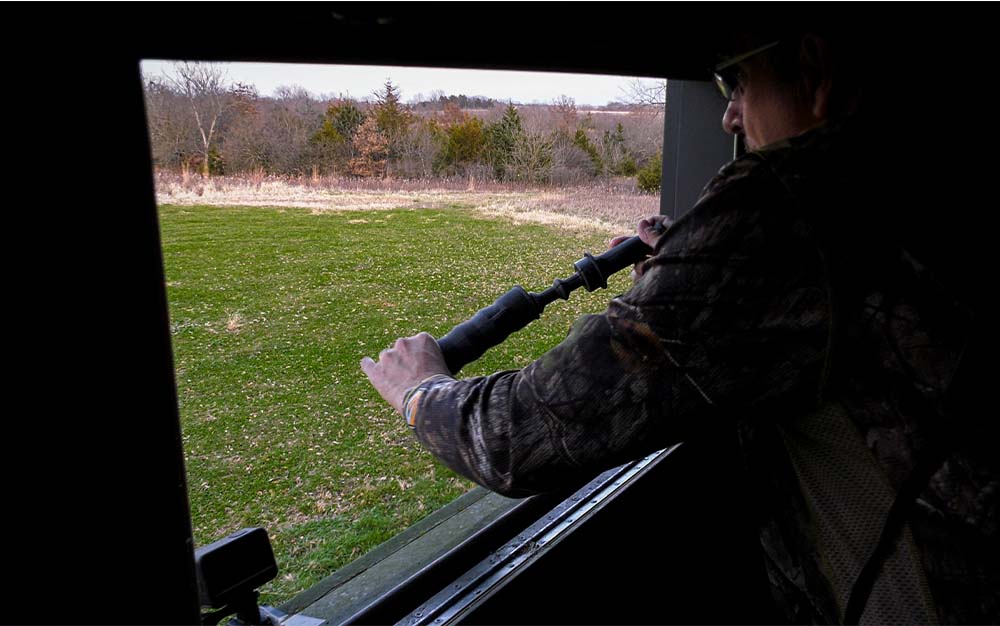
Mark Drury working the Rack Jack. Drury Outdoors
If there’s any time of year that Drury rattles off some blind calling, it’s during the rut. And if he suspects that there’s a deer in the area searching for a hot doe, he’ll do this same calling sequence with the Rack Jack, as long as he has a favorable wind and some type of terrain feature that blocks the deer from getting downwind of him.
Like other rattling calls, the Rack Jack requires two hands to use. However, this call strikes a sweet spot between typical rattle bags and real sheds. It produces more sound than a rattle bag, but it doesn’t eat up pack space like rattling antlers. You also don’t have to worry about making noise on the way to your stand, thanks to the interlocking design. This is the most expensive call on the list, but the intuitive design helps justify that price tag.
Will Primos: Buck Roar 2
Why It Made the Cut
Will Primos prefers the updated version of the Buck Roar, thanks to its hyper realistic sounds and the deep, raspy grunts it produces.
Key Features
- Reed and barrel design
- Wrist strap
- Separate snort wheeze tube
Pros
- Easy to use
- Produces deep, loud grunts
- Wrist strap makes it easy to keep up with
Cons
- Tougher to control low-volume grunts
Product Description
You can’t talk about deer calls without mentioning Primos, and who better to discuss the Buck Roar 2 than the hunter whose name decorates the call. Will Primos designed this call to make it easy for hunters to produce every buck vocalization. I spoke with him about how this call demonstrates that.
“The Buck Roar 2 is designed to produce a combination of sounds like a roar, the snort wheeze, your deep grunts, or even the higher-pitched grunts of younger bucks,” Primos says. “It doesn’t require a ton of air to make a realistic call.”
A great call isn’t worth much if you’re not using it right, so making the correct setup is critical whether you’re calling blind or to a buck that’s in sight, Primos says.
“If I’ve got the right set up, and I have a pretty good idea about where the deer has to travel, then I’ll start with the Can and make a doe bleat,” Primos Says. “I’ll wait about two minutes after that doe bleat and grunt aggressively, then I’ll wheeze and follow it up with an aggressive roar.”
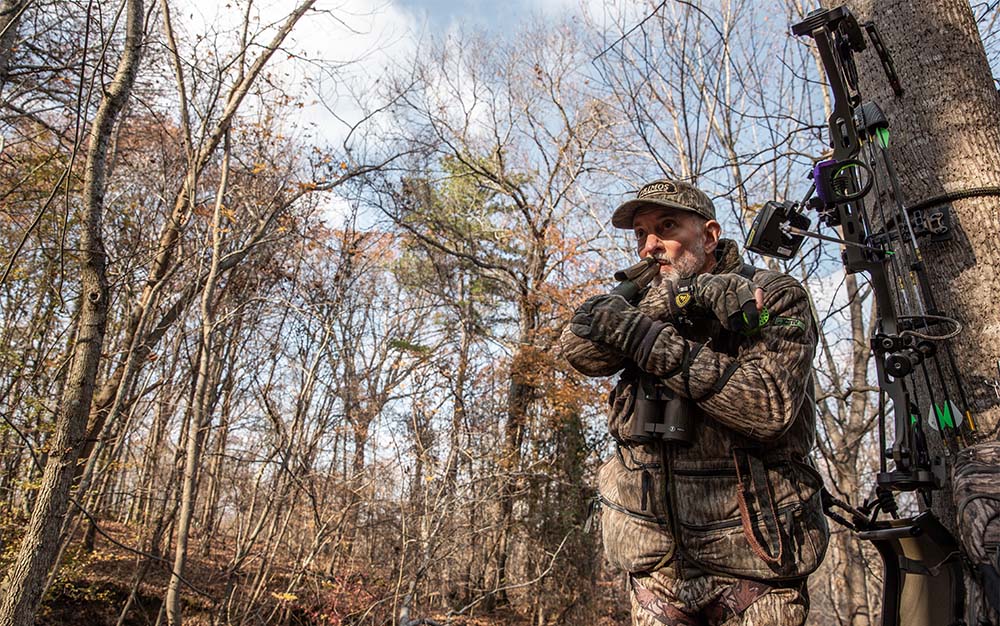
The strap on the Buck Roar 2 makes it easy to use when you need a free hand. Primos Hunting
When he uses this calling sequence, Primos tries to paint a picture of two bucks fighting over a doe. With the Buck Roar 2, you can make these calls with one hand by strapping the call on your arm. The strap allows you to call with your bow or gun in your other hand without having to make excess movement or noise. If you have the cover, though, you can use the call with two hands to dial in your calls by cupping your hand over the end of the tube to control the volume or manipulate the sounds.
Primos has had a lot of luck with that sequence in the past, but he doesn’t drum it up to some secret magical sequence concocted in the Primos lab. Instead, he says it’s about being confident in your calling and pairing that with a strategic setup that places you a few steps ahead of that buck’s travel route.
Best Doe Bleat: Primos Hunting The Original Can
Why It Made the Cut
This intuitive can makes it easy to use with one hand or with other calls to create a realistic scene. There’s a reason this classic call still makes it into most whitetail hunters’ packs.
Key Features
- Raised thumb-hole locator
- Variety of can options
Pros
- Packable
- Easy to use
- Budget friendly
Cons
- Makes unwanted noise if not properly stowed
Product Description
The Original Can from Primos Hunting is so easy to use it’s worth having in your pack for that reason alone. Simply place your thumb over the single center hole on the bottom of the can, and tip it over to make a doe bleat. It’s that easy, and it allows you to make this call with one hand. That way, you can use two calls if you’re trying to create a scene of a grunting buck chasing a hot doe. These calls are widely available, and at around $10 they won’t break the bank.
Best DIY: Shed Antlers
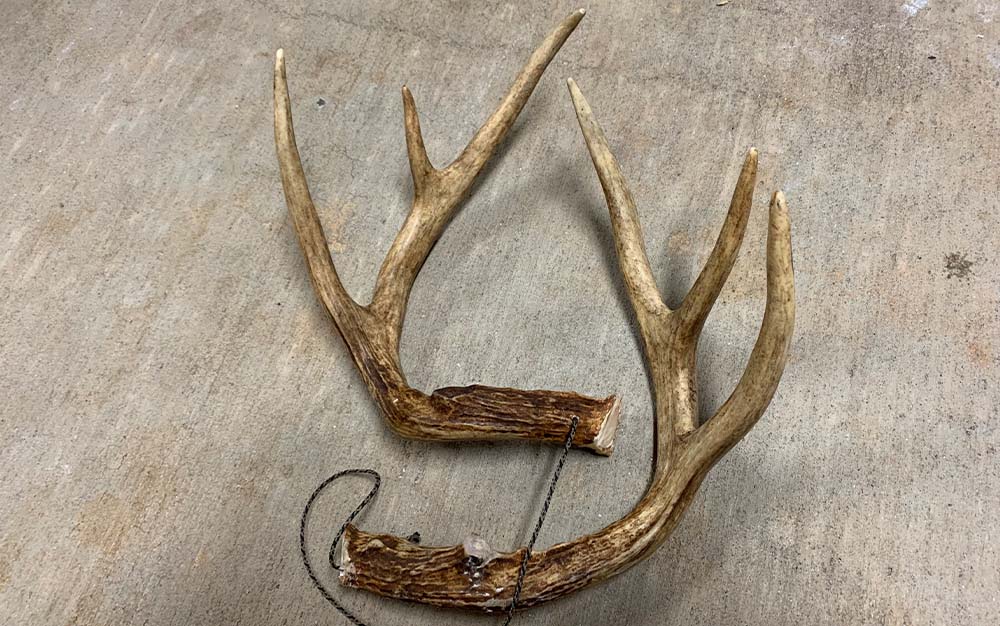
Rounding off the brow tines means you won’t accidentally drive one of them through your hand. Adam Moore
Why It Made the Cut
There’s nothing cooler than rattling in a buck with a pair of sheds that you find or from a deer you’ve already harvested.
Key Features
- Natural
- No harmful plastics
- Variety of sizes
Pros
- Ultra-realistic sounds
- Budget friendly
- Durable
Cons
- Can take up a lot of space
Product Description
Chances are you probably have a set of sheds lying around your house, so you can easily make yourself one of the best deer calls with a DIY pair of rattling antlers.
However, to produce the most realistic sounds, you’ll need a relatively recent pair. Older sheds can work, but if you’re trying to use a dry, brittle pair that’s softened over time, you won’t get the same tone that fresher antlers provide. You’ll also want a pair that’s large enough to produce enough sound. The more surface area you have to work with, the easier it will be to mimic two bucks trying to establish dominance. These don’t have to be sheds from a monster, but I wouldn’t recommend using a basket rack either.
Once you settle on a pair of sheds, make sure you grind down the brow tines, so you don’t accidentally stab yourself while rattling. Though optional, you can drill a hole through the bases, run paracord through them, and then tie off the ends so you don’t lose one of the antlers. Simply tying them together also works.
FAQs
Q: Do deer calls really work?
Yes, deer calls do work. They might not work all the time, or even most of the time, but they can and will get a deer’s attention. But it’s important to understand that there are several factors that go into deer calling. Most of the experts I interviewed emphasized that having the wind and terrain features in your favor can drastically affect your calling. Not to mention, each deer might have a different response to calls, especially if they’ve been heavily pressured.
Q: What time of day is best to call deer?
While there’s no one best time of day to call deer, you might be more likely to have success calling them when they’re most active (around first and last legal shooting light). Obviously, this depends on when and where you’re hunting, if the deer are heavily pressured, or if you’re hunting during different phases of the rut. But it’s also worth noting that Zach Ferenbaugh, who chases whitetails all across the country, has had luck calling during various parts of deer season.
Q: How far can deer hear a grunt call?
Terrain features and wind conditions can drastically affect this, but in normal conditions, deer can usually hear a grunt call 100 yards away.
Things to Consider When Buying a Deer Call
Most deer calls allow you to make the most common deer vocalizations like grunts, a snort wheeze, roars, clicking sounds, and even doe bleats, especially if you really know how to use a grunt call. However, there are some that just do a few of these really well, and you might have to buy multiple calls if you want the full vocabulary.
Grunt Tubes
All of the grunt tubes above allow you to create most deer vocalizations by blowing into an air chamber. There are also cheaper options that only allow you to grunt. A lot of these work just fine, but I’ve found that the reeds on cheaper grunt tubes wear out quickly, or the extendable tubes often lose their hold.
Doe Bleats/Distress Calls
A lot of grunt tubes/deer calls like the True Talker allow you to produce everything from fawn distress calls to deep buck grunts by manipulating the air flow and holding pressure on the reed in different places. However, there are products like the Primos Can that allow you to make doe bleats by placing your finger over a hole on one side of the call and simply tipping the can over.
Rattling Antlers
Several manufacturers, like Hunter Specialties or Primos, offer small, packable calls that produce the sounds that clashing antlers make when two bucks fight. You can also make yourself a DIY pair with sheds laying around your house. While true sheds are cool in their own right, they’re not the most practical. If you’re a minimalist hunter, the Rack Jack from Hunter’s Specialties or the Primos Rattle Bag might fit the bill better.
Methodology
For this review, I interviewed expert deer hunters on their go-to deer calls, as well as their calling tactics. I also wanted to incorporate hunters that use different strategies and hunt in a variety of terrains and regions to cover most scenarios that whitetail hunters might encounter.
Final Thoughts
Having the best deer calls in your pack is just half the work. Setting up with favorable conditions is the other. Whether you decide to blind call or lure in a buck that’s out of range, make sure you’re ready when he comes in looking for a fight.
The post The Best Deer Calls of 2022 appeared first on Outdoor Life.
By: Adam Moore
Title: The Best Deer Calls of 2022
Sourced From: www.outdoorlife.com/gear/best-deer-calls/
Published Date: Tue, 02 Aug 2022 20:39:17 +0000
----------------------------------------------
 Backyard GrillingWeekend WarriorsAdvice from DadBeard GroomingTV Shows for Guys4x4 Off-Road CarsMens FashionSports NewsAncient Archeology World NewsPrivacy PolicyTerms And Conditions
Backyard GrillingWeekend WarriorsAdvice from DadBeard GroomingTV Shows for Guys4x4 Off-Road CarsMens FashionSports NewsAncient Archeology World NewsPrivacy PolicyTerms And Conditions
